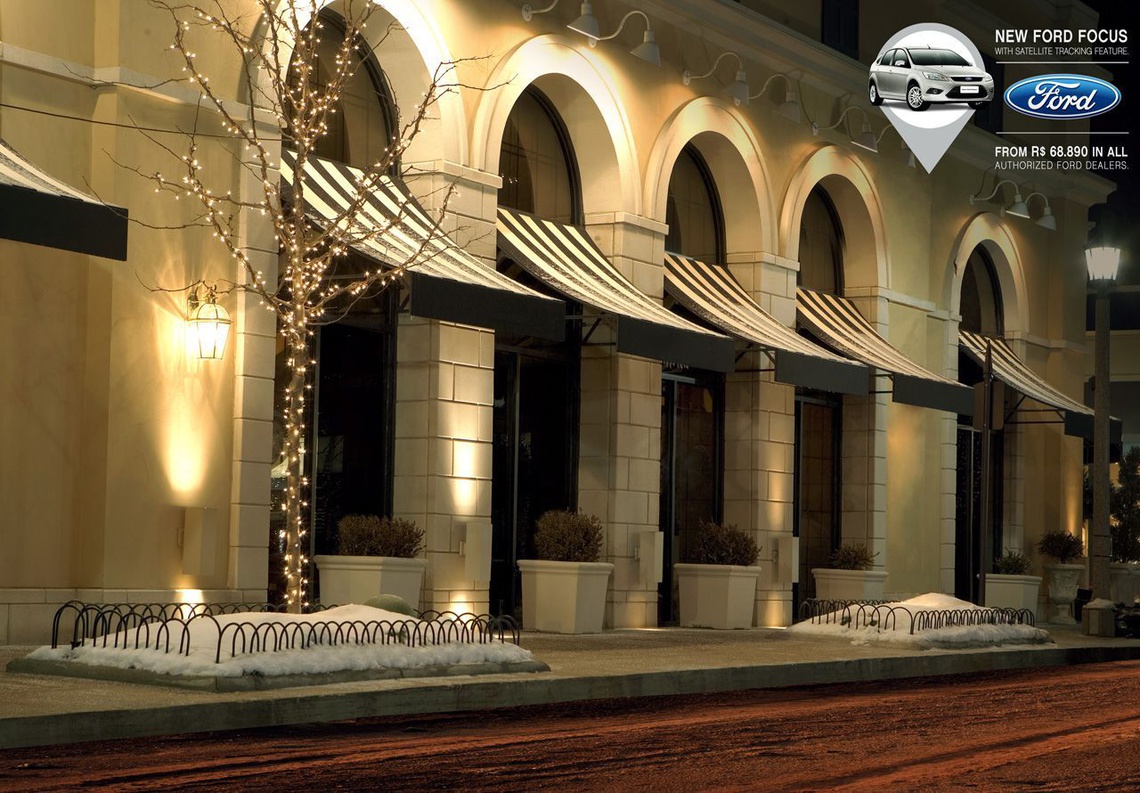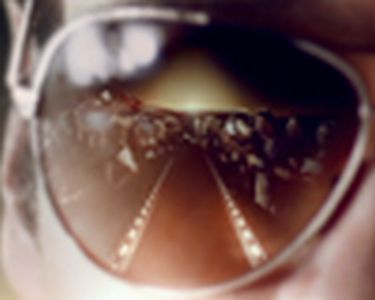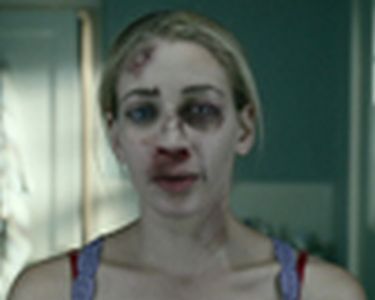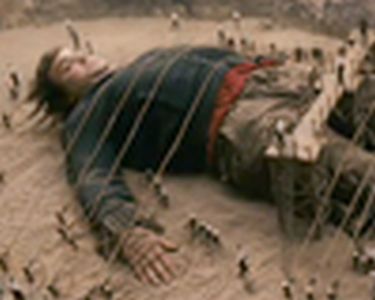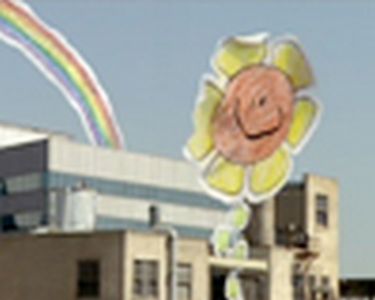Only the hairdressing world has more awards than advertising.The first interview KK gave to Archive appeared in the magazine in 1997. Back then, KesselsKramer had been around for about one year. Soon, it became one of the most talked-about agencies in the industry and a place just about every advertising student would have killed to work - or at least do an internship - at. The fruits of the labors of the first ten years can be found in a volume entitled "2 kilos of kesselskramer," which came out about five years ago. Then, Johan Kramer left to pursue his career as a writer and filmmaker. Now, "a new kilo of kk" has come out, showcasing the years since Johan's departure. Michael Weinzettl quizzed Erik Kessels and Creative Director Dave Bell of the London office, KK Outlet, about the agency's fortunes over the past five years.
L.A.: So how has the agency been devel-oping since Johan Kramer left?
Erik Kessels: A lot has changed and a lot has stayed the same. When we set up, in '96, the aim was to make useful, meaningful communication, which meant human, socially aware and risk-taking. That has stayed, we hope. Our size hasn't changed in the last six years - we've stuck to 35 people. There's still a healthy balance between commercial and non-commercial, big and small, Dutch and international. We still try and be as cross-disciplined as possible - that hasn't changed but, now, it is much easier to do; both the talent and the clients we come across are more tuned into that these days. But then the things that have changed ... we've definitely matured. We've expanded in other ways - a new office in London. And then there's the massive change in everything around us. Five years ago feels like a different planet. Now we contend with different kinds of crises, from financial to environmental. Creativity has exploded and isn't just the domain of agencies or companies. Technology is an integral part of lives. It all affects how you run the agency; how you keep things stable but still try and develop new things.
L.A.: Back then, you said that you didn't want us to think of KesselsKramer as an ad agency but as a set-up that "wanted to spread messages across all different media such as CD-ROMs, short films, editorial pieces, product development, graphic design as well as classic advertising." Judging from the work on view in "a new kilo," this is as true today as it was back then (if we forget "CD-ROMs" for a second), isn't it? Or have there been changes in the agency's philosophy since you started?
Dave Bell: It wasn't really a philosophy, more of an intuitive response to the way people looked at advertising. If we were bored with a lot of advertising out there, then surely the audience must be too. So this meant trying new ways of telling a message in as many ways as possible. But there's more to advertising than increasing its volume. It's about the quality of the work and the focus. The content of "a new kilo" shows a mix of clients - from a mobile phone network to a funeral museum - and a real variety of media. But the most important part is achieving a single, clear solution on top of it all, one that is sustainable. Perhaps the problem with advertising now - or let's call it communication - is that people get more excited about the new media channels or delivery systems that technology gives them than the content they are going to place into them. This results in everyone wanting to make an app, but without thinking of a meaningful solution to fill it.
L.A.: Can you tell us about the media you work across nowadays, and illustrate it with examples of your work done in the past five years?
Dave Bell: It's best illustrated by a few extremes. We just made the smallest and shortest ever film in the world, directed by Anton Corbijn, and starring Dutch actress Carice Van Houten. It lasts just one second long and comes in the form of a postage stamp. There was a big red-carpet, black-tie affair to launch it, lots of paparazzi, then everyone left after a second. The other extreme is a brand realization project for a hotel we named - and helped on every aspect - citizenM. From the personality of the hotel (that of globally aware travelers) to the design of the identity, to their signage, their site, even to the packaging and fragrance of the soaps, or how they induct their staff, it's all wrapped up in one tone, positioning and style. When you can be there at the inception of a brand and help it grow, you're not just an afterthought. You're helping create new models of companies, and bringing entrepreneurship and ideas together at exactly the right time - at the start. Finally, our contribution to the Venice Architecture Biennale (in the form of an installation called S1ngletown) is another extreme. The fact that a communication agency (in collaboration with Droog Design) was invited to give an opinion on architecture is another proof of vanishing boundaries between creative disciplines.
L.A.: How did the London office, KK Outlet, come about? What was the idea behind that? When did you start that and what happens there?
Dave Bell: We didn't want to grow our size in Amsterdam but still wanted to learn - grow in knowledge. So we asked ourselves what we would do if it were to start all over again. We get involved in projects around the world including Japan, Turkey, Spain, Italy, and even Azerbaijan, but our involvement in the UK was limited. So we decided to start up in London, in Hoxton Square, and create a hybrid company in a hybrid environment where all creative disciplines can be merged. At KK Outlet, you can walk into a shop, wander round a gallery and then go downstairs to a communication agency. It's less experimental than it sounds. Really, it's just putting a public face and an open door on what we have always done. It's a set up that works better in London than Amsterdam, mainly because the volume of people that would come to the store and exhibitions is far greater. So we host and curate exhibitions for the people of London with whatever inspires us. We do it very quick - a new show every six weeks. It feeds us, too, and brings us into contact with great emerging talent. The store came about because we make a lot of books through our own publishing company. It helps us showcase them, as well as products and books from other people or brands we like. It gives us a closer tie to commerce - we also have an online store - and it has to survive and thrive on its own strength. Above all, we develop communications for local UK companies - from larger ones like Diageo (for Bushmills Irish whiskey and Scottish malts like Talisker) and to more cultural and community projects or challenger brands. But in the end, whether people see it as a store or gallery or agency, to us it's all different forms of communication.
L.A.: Are you planning KK Outlets in other cities as well?
Erik Kessels: KK Outlet in London showed us that it is possible to expand without losing our DNA. In fact it has reinforced it. And it's stimulating - staff in Amsterdam can contribute to the output in London and vice versa. It also gives a strong bond for clients. The geography of this "boutique network" structure can be helpful. But will we open elsewhere? A lot of agencies pop up wherever they sense money is being made. We'd rather find a place that shares our ambitions and DNA. In the end, it's all down to the people who, locally, might want to collaborate with us. If we find them, we would dare to open up there.
L.A.: "Modern technology is killing the agency networks. Who needs an agency with 89 offices?" you said back in '97. Some of these agency networks are still around today - Leo Burnett still has over 90 offices worldwide. Any guess what makes them so seemingly indestructible?
Erik Kessels: Networks still exist, they're just not pioneering. These dinosaurs won't die out, most likely they'll evolve. Their role has changed and they are moving towards becoming distribution networks that adapt work produced by leaner independent agencies. For example, we're the global agency for J&B whisky but don't have an office in the 30 countries the campaigns roll out in. In the end, there is no creative monopoly any more. What might also make networks survive is that they are easy to understand. KesselsKramer and others out there like to work in different fields, and try new ones. A lot of networks have tried it but it's hard to sustain, a difficult model to keep up. People still don't know what to call us. Networks will always be ad agencies.
L.A.: Dave Bell, can you tell us a bit about your background? How long have you been with KK? Where were you before that?
Dave Bell: I've been at KK almost since the start, around 1996, when we were in a rectory instead of a church. Despite the two names on the door, KesselsKramer has lots of unsung heroes. I worked and studied in London before that (at the School of Communication Arts of John Gillard, which has just this year been revived), and have since returned to the UK capital to help head up KK Outlet. It's like being back to the start again - a nice sort of organized anarchy. Before KesselsKramer, I was Scottish.
L.A.: How did the cooperation with Pie Books come about? Why a Japanese publisher? What are KK's Japanese connections?
Erik Kessels: Pie Books has a great reputation when it comes to publishing books in graphic design and communication, and they included some of our work in other publications for some years. It probably helped that we've worked in Japan in the past. The Other Final was co-produced by a Japanese company (Robot), and we also worked for MTV Japan. Anyway, they then asked us to make a book with all the work that we did. We took it literally with two kilos (the first ten years) and a new kilo (the next five years) and put in everything we had ever made. We also believe that a Japanese company such as Pie Books is one of the very few who could make a book precisely two kilos / one kilo. A special paper was even devised to make sure each page weighed the correct number of grams.
L.A.: What do you think of advertising creativity today? Has it shifted to other media than the "classic" ones (i.e. print and TV)?
Dave Bell: The advertising itself hasn't shifted - there are still ads filling the magazines and TV channels - but the quality has. Sometimes, you flick on a TV set and you think it's 1987 again. Communication can be expressed easier through all the new (digital) and instantly accessible, constantly updated, channels. And it's also not only shifted to other media, it's shifted to other people. Agen-cies are no longer the embodiment of creativity they once thought they were. That's a great move. Consumers are crea-ting, posting, mailing, airing millions of creative expressions to their friends every day, making it much harder for the thousands of "creative" companies to stand out. However, despite the shift, there is still a need for some depth. The new channels promote skimming over subjects, stories and ideas. You don't always get a strong emotional connection. It reminds us of an article in the New Yorker, going on an anti-twitter/blog rant, and stubbornly saying that they won't change. They are about long-form journalism and the depth and delight you can get from that. There is something to be said for keeping the craft involved in the classic form of advertising like print.
L.A.: Well, do you think that the quality of print advertising in general has suffered as result of advertising's - and the clients' - great enthusiasm for the web?
Erik Kessels: Some brands think the inter-net is a get-rich, get-famous-quick channel. It doesn't work like that. Building a brand needs a lot of consistency and careful messaging. Print is one impor-tant outlet for that. We never start a process with a media channel. Some clients tend to see all the work on the web and realize consumers and smaller brands aren't spending $ 100,000 on art-work but are getting great results, and they want to copy that and move away from print. So, for print, it isn't about increasing quality, it's about increasing relevance. And to be more opinionated, and connected. It can be the door to wider experiences or initiatives that can be found on the web or in the real world. It's now possible to be an extension of the product or service - rather than just glorifying that product or service.
L.A.: Are the great ideas nowadays mostly to be found on the web?
Dave Bell: Yes, and they can be found within seconds. However, it's not that these great ideas are always formed on the web. They are displayed there for global viewing. Somebody somewhere is putting a great idea they saw on a street in downtown Sao Paulo for some-one in Oslo to digest. Great ideas in communication are now found in wider places - a gallery, the side of a groceryvan, on a piece of packaging - and we now have an easier, more single-minded outlet to digest them. Right now, the web is that channel. In the next years, it'll be mobile devices, partly because they are places where it is easier for companies to make money. When the web started, it was defiantly non-commercial. It allowed great ideas to be spread freely without commercial restraints. And they still are. The fact is, great ideas are continually being developed at staggering speed, and they are all open for viewing all the time. We can drown in it or we can immerse ourselves in it. In the end, what remains is the need to develop good ideas with a bit of heart and soul, regardless of the medium one uses.
L.A.: For several years, until 2005, you held the Diesel account, and Dave, you came up with a lot of fantastic campaignsfor them. What went wrong? What were some of the reasons why they moved on?
Dave Bell: We worked with them for five years, and are proud of the work, but sometimes marketing departments change and new marketing people have a preference of who to work with and, regardless of the work, you're asked to move on. It's a bit of a frustrating aspect of the industry. We'd rather have consistency. We like to build strong case studies of work, to make stories that keep moving forward. You're not building anything iconic or lasting if you keep changing your mind about your own direction.
L.A.: What do you guys think of the Diesel "Be Stupid" campaign that won the Grand Prix in Cannes this year?
Dave Bell: When we started with Diesel, our task was to make more sophisticated communication to justify a higher price range, while not losing Diesel's voice, which was ironic but often with a social or thoughtful message. It seems Be Stupid had its own brief - perhaps to appeal more to the younger masses,to be more immediate and less thoughtful. If that's the case, it's doing well.
L.A.: Do you still have the policy of not entering work at awards shows - or is it just certain awards shows that you shun?
Erik Kessels: We still don't enter awards (except effectiveness awards - they provethat the work is actually making a difference). Only the hairdressing world has more awards than advertising. There's a lot of money being made by the machine that makes them but it's already slowly dying; there are less and less entries every year. Maybe that's because people realize that it's important to get rewarded for your work but awards isn't the way. There are other ways to proudly showcase your work, for millions to appreciate. You don't need to go to Cannes.
L.A.: Back in '97, you said that a brand campaign of the future might consist of different messages every day. Nowadays, with social media - sites such as Facebook - this is becoming more and more a reality. Also, I recently talked to digital communications expert Daniele Fiandaca, and he said that digital adver-tising for a long time has "relied on driving people to a destination, which will either lead to direct sales or engage-ment (i.e. the brand website). But nowa-days it is this latter strategy of a brand-engagement site that is becoming less relevant as brands now have the oppor-tunity to bring content into their audiences' own spaces." Would you say that your prediction about the daily messages has thus become reality? Or what is your take on this and the use of social networks for advertising?
Erik Kessels: There is now an infrastructure where it is suddenly possible to make all those ideas lying around your desk or in your head live in the real world. It's a great, "doing" mentality. But social networks, on their own, lack real emotion and involvement. You can like, you can dislike, but then you move on. We prefer ideas that have a human contact. Sure, a brand campaign might involve these networks, but it isn't the start of an idea. It's the end result or the place to find it. It's like with a film: you watch it in a cinema but you don't go to see the cinema itself. So it's interesting to see the development of bringing content into the audience's own spaces, or hands or streets - as long as it avoids the tag of guerrilla marketing, which was basically polluting the audience's territory. It should be more about useful collaboration rather than filling space. It's better to develop meaningful relationships, to be socially minded rather than technology minded.
L.A.: Outside of KK's work, what, to you, have been some milestones in advertising in the past five years?
Dave Bell: The biggest milestone in advertising is the democratization of creativity. It punctured lots of egos and is helping to weed out the industry's selfish nature. A lot of the mystique around creativity has been cleared out. Everyone can do it and be responsible for it. Everyone knows about the whole process. Clients are free to look up the rest of the portfolio of a photographer, then link it on to their friends or colleagues. Everyone can be a specialist. And people are making stuff for the fun of it, or to advance ideas, and not for money. It's like a global creative college or mass creative department without the cappuccinos or paychecks. So it makes people in advertising a bit nervous, but it's what we all, or most of us, started doing it for. The biggest advantage of this democratization is that the idea, ironically, becomes even more important. You might know the process, you might know how to make ideas but, by knowing that, there is even more weight put on the very good ideas.
L.A.: What happened to the "do" brand? Does it still exist? And what have you learned by developing your own brand over the years?
Erik Kessels: "do" was invented way back in 1996, as a reaction to and as discussion point for other brands. Its purpose was to become a two-way brand that creates dialogue, instead of being one-way, as was the norm. It's still ongoing and it's still in an experi-mental phase. We've recently made a punchbag called "do box," which is made of paper and can be filled with trash so you can recycle and get rid of your aggression. We still do workshops giving the "do" view on brands: where brands can go in the future, and how to make them more social and aware. We've published a book, "101 things to do," which is like an amalgamation of all the "do" thinking. But things have changed, of course, since '96. Companies don't only ask for an audience's active involvement - they are some-times created with that sole purpose in mind. There are great ideas like crowdfunding, which is like a do together initiative to make ideas happen. So brands have moved on, which means "do" will evolve and try to move on even further.
L.A.: Can you tell us about KK's future projects?
Erik Kessels: We'd like to continue to build things we've started in the last years. We'd also like to work with a few more international clients and create autonomy with them. Create work that makes a continually evolving story. We also want to keep doing things we never did before. For example, we're making a move into urban planning. It's for Amsterdam's main square, the Museumplein. This square is the home for the city's most important cultural institutions (Van Gogh Museum, Museum of Modern Art, Rijksmuseum) that attracts millions of visitors each year. Our task is to merge the landscape of the square with these institutions and the millions of visitors. Besides that, KK Outlet in London still feels like it is at the start, and there's still lots to make and do there. The restlessness will continue ...
L.A.: Where do you see advertising headed in the future in general?
Dave Bell: Advertising needs a new name. Who in their right minds calls themselves an advertising agency, or would even wish to start one? It's a one-dimensional term. There is hardlyany client in the world that briefs their agency to make an advertising campaign. They might ask for a participation platform. An idea that engages. Whatever it is called, advertising is no longer alone. The convergence of creativity means we can all learn from, and work with, different creative disciplines that exist beyond advertising. TV writers, theatre directors, sound artists. You can kill or revive a brand on your favorite social media outlet with a thousand thumbs up or down. We all advertise now. Where is advertising heading in the future? Into a giant food processor which is about to be turned on to top speed.
L.A.: Where do you guys get the inspiration for your work? How do you feed your creativity?
Erik Kessels: We like to look in the worst possible places. Everything's still a bit too slick in communication. There is not enough room for mistakes anymore. It's like driving constantly with the satnav on - you get there but don't know how you got there. So the best places to look are outside the glitz and polish, on the fringe. We often work with people on the periphery. Photog-raphers who haven't done a commercial job in their lives. It surprises us, and adds an unusual perspectives to a fundamental idea. Then, in London, at KK Outlet we like to showcase the interesting people we work with. So the walls where we work are a continually changing source of inspiration.
L.A.: What interests you outside of your work? Or is there no clear separation between work and play for you?
Dave Bell: KesselsKramer was set up to allow a place where hobbies and interests could be incorporated into the work. That's play. Outside work is family. That's play too.
L.A.: How is Johan doing these days? Is he still in touch with the agency and familiar with what's going on?
Erik Kessels: We don't meet on Facebook. Our social network is a place called Harry's Koffiehuis near KesselsKramer. And we swapped Panini football cards recently, helped each other complete our collections. Aside from that, we always show each other what's going on in our worlds. There's no competition, just mutual respect.


